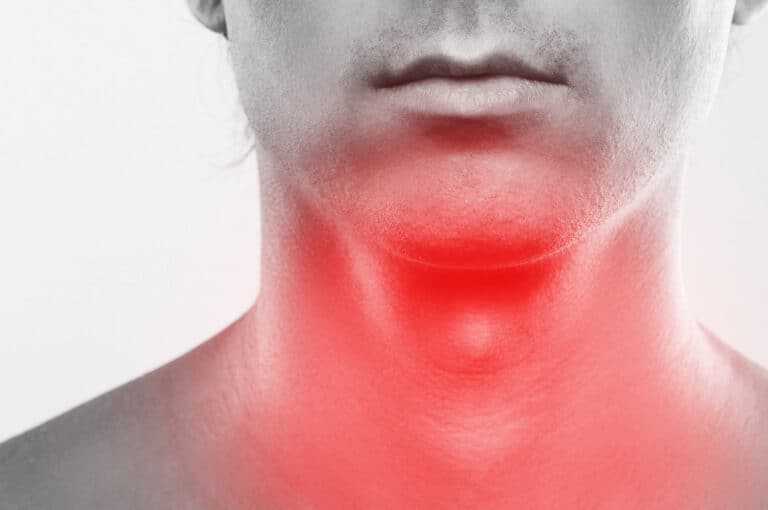Gynecomastia often surprises men and their families, especially when it develops out of the blue. When breast tissue in men starts to increase, hormones are frequently to blame, but the story does not always end with testosterone or estrogen.
At the Phoenix Gynecomastia Center, many men discover that their hormone imbalance is rooted in a deeper medical condition: thyroid disorders. Understanding this connection helps patients take charge of their health and get the right support for both their thyroid and their chest.
Let’s explore how the thyroid can play a hidden role in male breast growth, and what steps you can take if you notice these changes.
Key Takeaways
- Thyroid impact: An overactive or underactive thyroid can trigger hormonal shifts that cause male breast growth.
- Hormonal imbalance: Changes to testosterone and estrogen due to thyroid issues disrupt the usual male-female hormone balance.
- Symptoms to watch: Men may notice breast swelling, tenderness, or nipple changes in addition to other thyroid-related symptoms.
- Diagnosis steps: Comprehensive blood tests, physical exams, and medical history are important for getting to the root of gynecomastia.
- Treatment options: Addressing the thyroid disorder often helps, but some men benefit from additional medical or surgical options.
- Emotional effects: Male breast enlargement can impact body image and confidence, but support and proper care are available.
- Local expertise: The Phoenix Gynecomastia Center is prepared to guide men through both diagnosis and treatment options for the best outcome.

Understanding Thyroid Disorders
The thyroid is a small gland in your neck, but it has an outsized role in keeping your body in balance. When the thyroid’s function changes, it can set off a chain reaction throughout your system, including hormone shifts that affect breast tissue.
What Is the Thyroid and What Does It Do?
Your thyroid gland sits at the front of your neck, shaped a little like a butterfly. It produces hormones that help regulate your metabolism, energy use, and many bodily functions.
When the thyroid works as it should, your body’s energy stays well balanced. An underactive or overactive thyroid can disrupt this harmony. The hormones produced by the thyroid, especially thyroxine (T4) and triiodothyronine (T3), act on nearly every organ. They help control how your cells use energy, how your heart beats, and even how much you sweat.
Common Types of Thyroid Disorders
Thyroid disorders come in several forms. Each has a unique way of disturbing the body’s normal hormone patterns.
- Hypothyroidism: The thyroid is underactive and produces too little hormone. Symptoms might include fatigue, weight gain, and feeling cold.
- Hyperthyroidism: The thyroid is overactive and releases too much hormone. This causes symptoms such as rapid heartbeat, weight loss, and nervousness.
- Thyroid nodules or cancer: Nodules or abnormal growths in the thyroid may also cause changes in thyroid hormone levels.
These thyroid issues can disrupt other hormones, including the ones responsible for male breast tissue growth.
How Hormones Regulate Male Breast Tissue
Male and female bodies both have glandular breast tissue, but hormonal differences keep male breast tissue small. Normally, testosterone suppresses breast tissue development while estrogen encourages it.
In a healthy man, testosterone is much higher than estrogen. The small amount of estrogen present is balanced out by stronger testosterone signals.
When hormone levels shift, particularly if estrogen rises or testosterone drops, the tissue balance changes too. Even small changes can begin to stimulate male breast tissue growth.
This is why many hormonal disorders, including those involving the thyroid, can trigger gynecomastia. The effects may take weeks or months to develop and are often painless at first.

How Thyroid Disorders Cause Gynecomastia
The connection between the thyroid and male breast tissue may not be obvious at first glance. However, the thyroid gland’s hormones interact closely with the sex hormones throughout your body.
When thyroid function is disturbed, this can affect how your body produces, uses, or responds to both testosterone and estrogen.
Hyperthyroidism and Male Breast Growth
Hyperthyroidism is particularly linked with male breast enlargement. In men, an overactive thyroid increases the levels of a protein called sex hormone-binding globulin (SHBG).
SHBG binds more testosterone in the bloodstream, making less of it available for your body’s tissues. At the same time, estrogen can become relatively more active, since it is not as tightly bound by SHBG.
This shift allows estrogen-like effects to take hold, including the stimulation of male breast tissue.
Hypothyroidism and Hormonal Changes
Hypothyroidism is less likely than hyperthyroidism to cause gynecomastia, but it can still play a role.
When the thyroid is underactive, your metabolism slows down and your hormone systems can become unbalanced. Over time, low thyroid hormone levels can increase overall body fat, which leads to more estrogen being produced from fat tissue. This extra estrogen can also stimulate male breast growth, though the changes may be more gradual.
Other Mechanisms at Work
The thyroid also affects other systems that interact with breast tissue. For example, thyroid dysfunction may slow down liver function, which plays a key part in removing extra estrogen from your body.
Hormonal medications used to treat thyroid problems can also alter the estrogen-testosterone ratio. For men with genetic or metabolic risk factors, even a small disruption in thyroid function can tip the scales.
Recognizing the Signs: Symptoms of Thyroid-Related Gynecomastia
Thyroid disorders cause a range of symptoms. When gynecomastia develops, it can bring both physical and emotional changes.
Here are some signs you might notice if your breast enlargement is related to a thyroid disorder:
- Breast swelling: Many men report a firm, rubbery swelling beneath one or both nipples. This may feel tender or sore.
- Skin changes: The skin over the nipple might appear stretched or slightly shiny.
- Nipple sensitivity: The nipples may become sensitive, especially to pressure or touch.
In addition to breast changes, you may notice symptoms of thyroid dysfunction, such as:
- Unexpected weight change: Rapid weight loss may indicate hyperthyroidism, while weight gain may signal hypothyroidism.
- Fatigue and mood changes: You may feel tired, anxious, or have trouble sleeping.
- Cardiovascular symptoms: Irregular heartbeat or rapid pulse can hint at thyroid problems.
If you observe any of these symptoms, it’s important to share them with your provider. They often appear together, but sometimes one set of symptoms is more obvious than the other.
Diagnosing the Underlying Cause
The process of identifying thyroid-related gynecomastia involves several steps. At our practice, we begin with a detailed history and physical exam, looking for both breast changes and signs of thyroid dysfunction.
Comprehensive Hormonal Evaluation
A thorough blood test is essential to check your thyroid function and sex hormone levels. These tests often include:
- Thyroid-stimulating hormone (TSH)
- Free and total T3 and T4
- Testosterone and estradiol (a key form of estrogen)
- SHBG (sex hormone-binding globulin)
- Liver function tests
Tests can also rule out other causes, such as liver or kidney problems and medication side effects.
Breast Tissue Assessment
A careful physical exam helps differentiate true gynecomastia (glandular tissue growth) from pseudogynecomastia (fatty breast enlargement). Ultrasound or other imaging tests may be used in some cases to assess the amount and type of tissue present.
Evaluating Overall Health
Since thyroid disease can affect the heart, bones, and mental health, a complete health review is part of the assessment. This may include checking your heart rate, blood pressure, and neurologic function.
Bringing all these results together allows us to design a treatment plan suitable for your specific needs.
Treatment Options for Thyroid-Related Male Breast Growth
Treating gynecomastia related to thyroid disorders usually starts with correcting the thyroid problem. Depending on your situation, additional support may be needed to resolve the breast changes.
Restoring Thyroid Balance
The primary goal is to bring your thyroid hormones back into a healthy range. Treatment options include:
- Medication to reduce thyroid hormone production for hyperthyroidism
- Thyroid hormone replacement for hypothyroidism
- Radioactive iodine or surgery in select cases of thyroid disease
As the thyroid comes back into balance, your hormone levels start to normalize. This may lead to a partial or complete reduction in breast swelling over several months.
Monitoring Breast Tissue Changes
Most patients experience gradual improvement in gynecomastia if the thyroid disorder is successfully managed. Regular follow-up appointments help track your progress. If symptoms are not improving after several months, your provider may discuss additional options.
Medical and Surgical Interventions
If breast tissue is still enlarged after your thyroid stabilizes, further treatment can be considered.
- Medication: Certain medications might help shrink breast tissue by blocking estrogen receptors or adjusting hormone levels.
- Surgery: In cases where breast swelling persists and causes discomfort or distress, surgical removal of glandular tissue often delivers a satisfying, lasting result.
Many men at the Phoenix Gynecomastia Center choose surgery if breast changes interfere with their quality of life. Recovery is usually straightforward and outcomes are very predictable when performed by a skilled team.
Emotional and Psychological Concerns
Male breast growth can take a serious emotional toll, especially if it persists for months or becomes visible through clothing. You may also worry about what friends or family will think, or avoid activities you used to enjoy.
It is important to remember that gynecomastia is medically common. At our practice, we recognize the effects on self-image and confidence, and we work closely with patients to provide support and reassurance.
For many men, understanding the medical cause brings relief. Clear communication and a plan for improvement, whether medical, surgical, or both, often restore confidence.
Proactive Steps: What To Do If You Notice Changes
Prompt attention to new breast changes can make a big difference in outcomes. Here are proactive steps you can take if you develop symptoms of gynecomastia:
- Make note of when you first noticed swelling or tenderness.
- Jot down any new symptoms, such as weight changes, fatigue, or changes in appetite or heart rate.
- Check your medication list, as some drugs increase the risk of gynecomastia.
- Schedule a consultation with a provider who has experience treating both thyroid and breast tissue concerns.
Early evaluation and treatment can resolve your symptoms more quickly and prevent unnecessary worry.
Preventing Recurrence and Managing Long-Term Health
After treatment, maintaining your long-term health is a priority. Prevention focuses on managing your thyroid condition, tracking hormone levels, and making healthy lifestyle choices.
Regular checkups help ensure your thyroid medications are still appropriate. If you notice any new symptoms in the future, reach out for evaluation.
Weight management, balanced nutrition, and moderation in alcohol intake support hormone health overall. Let your provider know about any new medications, as some may trigger hormone changes.
With these steps, the risk of recurrence stays low for most men.
Moving Forward with Clarity: Your Next Steps
Understanding how thyroid disorders contribute to male breast growth empowers you to take charge of your health. You now know that hormone imbalances, especially involving the thyroid, can cause significant and unexpected changes in the male chest.
If you notice swelling, tenderness, or other changes in your breasts, do not ignore them. Early attention leads to a faster diagnosis and, in most cases, simpler treatment.
At the Phoenix Gynecomastia Center, our team is ready to guide you through diagnosis, personalized treatment, and long-term care. We understand the physical and emotional impact of gynecomastia and are here to help at every step.
If you have concerns about breast changes or thyroid health, reach out to schedule a confidential consultation. Taking proactive steps now sets you up for the best results, greater confidence, and lasting well-being.

